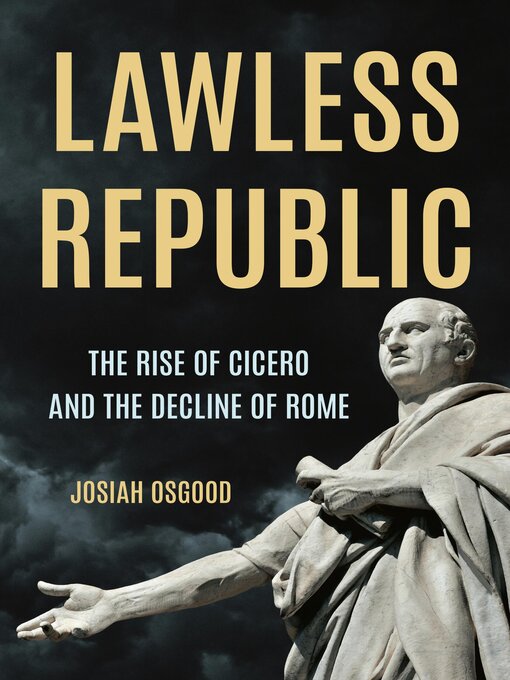In its final decades, the Roman Republic was engulfed by a crime wave. An epidemic of extortions, murders, and acts of insurrection tested the court system’s capacity to maintain order. As case after case filled the docket, an ambitious young lawyer named Cicero seized every opportunity to litigate, forging a reputation as a master debater with a bright future in politics. In Lawless Republic, historian Josiah Osgood recounts the legendary orator’s ascent and fall, and his pivotal role in the republic’s lurch toward autocracy.
Cicero’s first appearance in the courts came shortly after the end of a brutal civil war. After leveraging his fame as a lawyer to become a consul, he ruthlessly crushed a coup by suppressing the liberties of Roman citizens. The premiere legal mind of Rome came to argue that the pursuit of a higher justice could sometimes justify sweeping the law aside, laying the groundwork for Roman history’s most famous act of political violence—the assassination of Julius Caesar.
Lawless Republic vividly resurrects the spectacle of the courts in the time of Cicero and Caesar, showing how politics trumped the rule of law and sealed the fate of Rome.
-
Creators
-
Publisher
-
Release date
January 21, 2025 -
Formats
-
Kindle Book
-
OverDrive Read
- ISBN: 9781541604261
-
EPUB ebook
- ISBN: 9781541604261
- File size: 7587 KB
-
-
Languages
- English
-
Reviews
-
Kirkus
December 1, 2024
The life of the Roman orator, lawyer, and politician Cicero. If you can read the history of the late Roman republic without being confused by all the players and their contending agendas, then you're a rarity. In Cicero's case, considerable confusion lies in constantly shifting alliances and some very well-placed enemies. In one episode that Georgetown University historian Osgood examines at considerable length, a freed slave named Chrysogonus, operating under the aegis of the tyrannical ruler Sulla, engineered the murder of a wealthy provincial landowner and took over his estates, having declared his victim an enemy of the republic. (If this sounds more like organized crime and less like the governance of a growing world power, then you're on the right track.) In the long trial that followed, Cicero delighted his audience with a snippy putdown of the prosecutor that would never pass in court today: "Even if fortune hasn't allowed you to know who your father is and so to learn how a father feels toward his children, nature at least has endowed you with some human feeling." Indeed, as Osgood recounts, the Roman legal system, though with some vestiges in our own, was less concerned with evidence than with good storytelling and smart rhetorical tricks, at which Cicero excelled. But those sorts of skills can also earn a fellow enemies: going up against both Sulla and, later, a powerful, rule-bending politician named Clodius, Cicero marked himself for retribution. Osgood's account of one particularly complex episode in Roman history, known as the Catiline conspiracy, is as clear as circumstances will allow--which is to say, one still needs a score card. It will be up to the reader to gauge whether Cicero had it coming, whether Julius Caesar was a good guy or a bad guy, and so on. Richly detailed, if sometimes a slog. Still, the best life of Cicero to have come along in a long while.COPYRIGHT(2024) Kirkus Reviews, ALL RIGHTS RESERVED.
-
Library Journal
December 1, 2024
Osgood's (classics, Georgetown Univ.; Uncommon Wrath) book spotlights the Roman judicial system; its most famous litigator, Marcus Tullius Cicero; and how they influenced many modern countries. For example, two Roman judicial tenets--that a defendant is innocent until proven guilty and that the burden of proof is on the accuser--form the foundation of the U.S. legal system. This book describes the Roman republic's final decades, when Cicero came to be greatly regarded as a lawyer and politician. He wrote out many of his summations, and this book makes readers privy to them. Osgood thoroughly examines Cicero's methods in his most famous cases. The book shows that major trials, viewed as entertainment by prosperous Romans, were conducted at the Forum, where Cicero's gift for eloquent oration was on full display. Echoes of it can be heard today in courtrooms, television programs, and films in which clever lawyers enthrall audiences. VERDICT A welcome contribution to the study of Roman law and Cicero. Osgood aptly demonstrates how the Roman government, guided by Cicero, sought to reinstall its system of law and order to reassure long-suffering citizens who had endured a protracted, unprecedented era of civil discord.--Brian Renvall
Copyright 2024 Library Journal, LLC Used with permission.
-
Formats
- Kindle Book
- OverDrive Read
- EPUB ebook
subjects
Languages
- English
Loading
Why is availability limited?
×Availability can change throughout the month based on the library's budget. You can still place a hold on the title, and your hold will be automatically filled as soon as the title is available again.
The Kindle Book format for this title is not supported on:
×Read-along ebook
×The OverDrive Read format of this ebook has professional narration that plays while you read in your browser. Learn more here.


